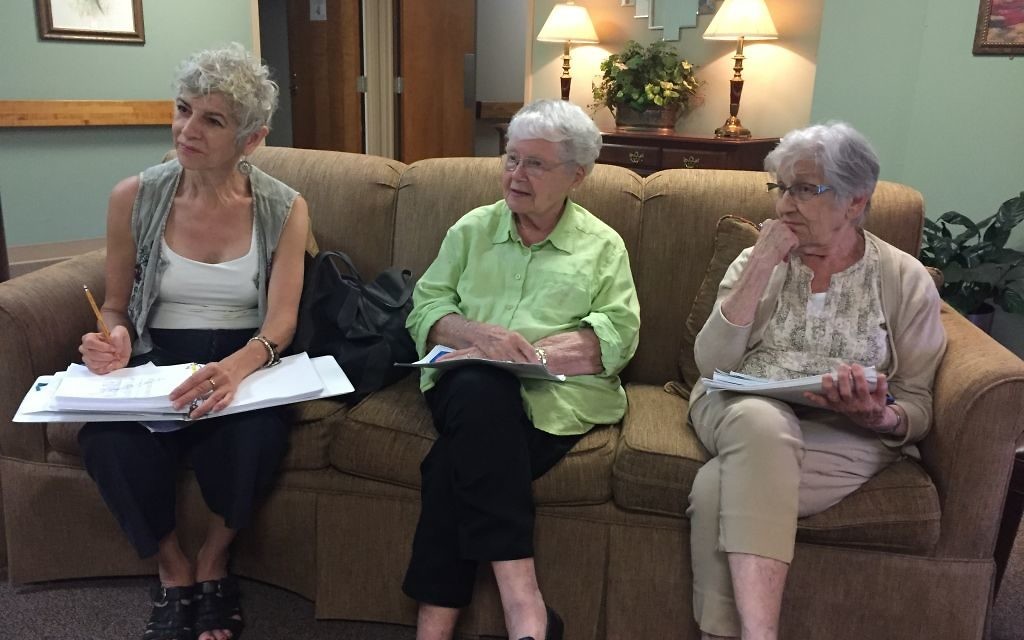Kvelling While Recrossing ‘Delancey’
A non-Jewish actress learns a smidgen of Yiddish for Bubbie Kantor 27 years after playing her granddaughter.

The issue was the ch sound, a guttural noise that resembles someone clearing his throat.
Mary Lynn Owen says, “I need more saliva.”
“For that you need your gorgl,” she is told.
Get The AJT Newsletter by email and never miss our top stories Free Sign Up
(Readers may want to keep a Yiddish-English dictionary handy, and, remember, spellings are phonetic.)
Owen sat in with the Yiddish group at the Jewish Tower while preparing to play Bubbie Kantor in the Alliance Theatre’s production of “Crossing Delancey.” The play, written by Susan Sandler, will be performed Oct. 7 to Nov. 18 at the Marcus Jewish Community Center (the Alliance’s home at the Woodruff Arts Center is being renovated).
Twenty-seven years ago, Owen played the role of Bubbie’s granddaughter, Isabelle “Izzy” Grossman, in Theatrical Outfit’s production of the story, best known from the 1988 film version that starred Amy Irving as Izzy and Peter Riegert as Sam Posner, “the pickle man.”
Izzy, a 33-year-old woman in New York who lives in a highbrow literary world, resists and eventually is wooed by Posner in a shidduch engineered by her 70-something bubbe.
Owen, who is not Jewish, was 32 years old when she played Izzy.
“In 1990, I believed that Izzy had all the time in the world. Now, through the eyes of Bubbie, I see that the clock is ticking,” Owen, a veteran actress and instructor in the theater studies department at Emory University, said in an interview.

“What I enjoy so much about Bubbie is her embracing of life as is,” Owen said. “Pleasure and pain are weighted equally. She speaks candidly about everything — with a few theatrics for good measure — and when referring to herself, she doesn’t downplay the pain of her past, or her own strengths, or her own beauty. … Her forthrightness is my personal goal. Maybe it comes with the permission of age.”
On this day, Owen sits with six women and one man as they review words in the back half of the alphabet, from nosh, nebbish and nudnik, through schicker, schmaltz and schpilkis, until reaching zaideh and zaftik, though somehow — between tummel and vilda chaya — farklempt, farkachta and farschtopt come up for discussion.
Carolyn Goldsmith, who organized the group, struggles to control the conversation, which zigs from debate about the usage of numerous words for the male sexual organ (which you will not find here) and zags to recipes for tsimmes and lokshen kugel.
“They remind me of my Cuban aunts and uncles. They’re loud, they interrupt each other and correct each other, and they’re a heck of a lot of fun,” Owen said later.
The connotations of certain words prompt Lenny Schechter (no relation to the other Schechter in the room) to say, “All Yiddish is not sweet.”
Owen has questions for these alte menschen.
“How would you use this in a sentence?” she asks about “Nu?”
“Could you kvell so much that you plotz?” she asks, setting off laughter.
“Do you say the ‘t’ in tsurris?”
Kvetch is a one-syllable word, she is told, as the assembled take turns kvetching.
Some questions are serious, such as her inquiry about the meaning of shiva and its customs.
Owen, an Episcopalian, is not certain why, but she has played numerous Jewish roles in her career.
Her father was a circuit-riding Methodist minister in Athens, Augusta, Snellville, Riverdale and other area locales. When she was age 10, he gave her a book titled “What Is a Jew?”
“I grew up with this healthy affection for Judaism,” Owen said.
The Yiddish group is impressed by Owen’s efforts to pronounce words in a once-fading language now experiencing something of a revival.
“It’s actually been fun. And very interesting. Bubbie’s lines are mostly in English with the occasional Yiddish phrase, word or song, so mostly I’m working on speaking with the Yiddish dialect,” Owen said.
“Well, this may change, but so far, I’m partial to the word schmendrick,” she said. “It’s fun to say. And I know a few. I also like the phrase ‘What are you, haken me a tsheinik?’ ”
Here’s wishing Owen plenty of mazel.




comments